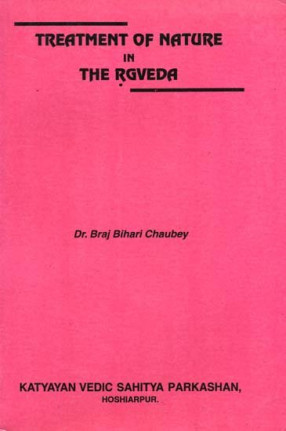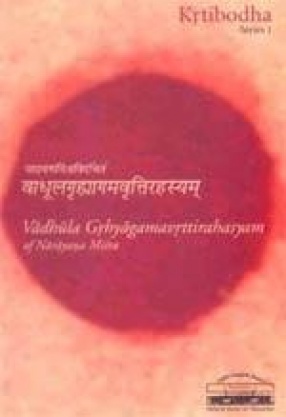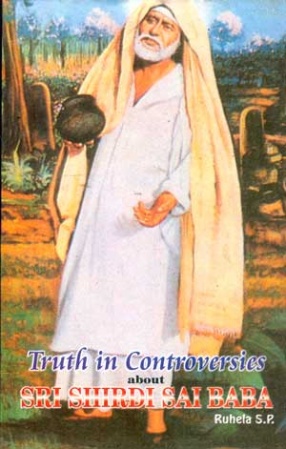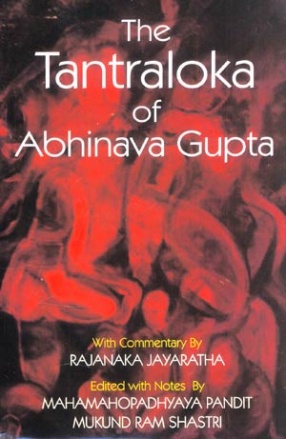Treatment of Nature in the Rgveda
The Rgveda as the most ancient literary monument of the Aryan race, nay, of the whole world, is the most authoritative source of the religion, philosophy and poetry. For acquiring knowledge of the history of Indian religion, philosophy and poetry, its study is most essential. No investigation into the nature and origin of the gods of Indian theology, is possible without the help of the Rgveda, Therefore, it is lit and proper for the seeker of the knowledge of Indian religion and poetry to go to the Rgveda. Ours is the age of science. The Vedas are not now the special possessions of any class or sect. They are open to all scientific minds; "The Treatment of Nature in the Rgveda" is an attempt to solve on modern lines the mystery of Nature which the Rgvedic seers had visualized. From a critical study of the Rgveda it becomes obvious that Nature was the vital source of inspiration for the Vedic seers. The religious and the philosophic conceptions, which they developed, were the outcome of the observation of the various physical phenomena of Nature. The beauty and sublimity of these phenomena inspired the feelings which found expression in the form of beautiful lyrics, addressed to Gods and Goddesses, which, in reality were deeply emotional descriptions of the various phenomena of Nature. The present work "Treatment of Nature in the “Rgveda" is inter alia, an endeavour to give a clearer idea of how the Rgvedic seers visualised Nature. Mainly there are two angles of visualising Nature, one religious and the other poetic, Accordingly, the work is divided into two parts-Religious Approach to Nature and Poetic Approach to Nature. Part I consists of live chapters, Chapter first deals with what the Rgvedic poets meant by Nature, and what terminology they had invented to designate the totality of the physical phenomena, The second chapter fully discusses the part Nature has played in the Formation of Vedic religion together with some observations on, and the examination of the different theories about the origin of religion in general and the Rgvedic religion in particular. The third chapter mainly consists of an answer to the question ‘who are these Gods? The view that Vedic Gods are living human beings or psychic powers does not give us a correct idea of the spirit of the Rgveda. Hence, I have criticised these views and established that Rgvedic Gods are nothing but personifications of the physical phenomena of Nature, In the fourth chapter, various theories proposed by oriental as well as occidental scholars to explain the myths of the Rgveda have been detailed and explained. In the conclusion of this chapter, I have expressed my definite view that the myths connected with the various gods can best be explained and understood, in the light of the regional classification of Vedic deities as proposed by the Nairuktas, In the fifth chapter, various modes of worship and the objects of worship in Nature are discussed. The most important among the latter, viz., the Sky the Sun and Agni are selected for individual treatment. Part Il deals with the Rgveda as a line specimen of Nature- poetry. It consists of three chapters (numbered in continuation} wherein chapter VI describes and illustrates Nature-poetry in the Rgvedic hymns in general and in the songs addressed to the Maruts, the Sun, Parjanya and Night in particular. Chapter VII describes the Rgvedic concept of Beauty in poetry and Chapter VIII the poetic beauty in the Usas—suktas. In the Introduction of this book I have given a retrospect of Rgvedic studies in ancient as well as in modern time in India and abroad, There is nothing original here. However, it will be 1 L most useful for the student of the Rgveda anxious for conducting p research in this field. Much work has been done by oriental as well as occidental scholars on Vedic mythology and religion, viewing Nature as their ground-work; Scholars have also taken pains to evaluate the merit of the Rgvedic poetry from tl1e viewpoints of modern criticism. But in the vast realm of literature written on Vedic mythology, religion and poetry, no work has appeared so far which may be mainly devoted to the part played by Nature in the evolution of Rgvedic religion and poetry, It is for the first time that I have discussed the various modes of Nature—description in the poetry of the Rgveda. In writing this work I have followed both the critical and the descriptive methods, While discussing the religious approach to Nature I have first given the views of earlier authorities on the subject, and where l have found them deviating from the text of the Rgveda, I have criticised them and given my own judgement `V supported by the Rgvedic texts and the Nirukta of Yaska. For the clear understanding of the subject 1 have given the text of the Rgveda in footnotes with proper accent, and its purport in the body of the book. While quoting the Rgvedic passages I have given Griliitl1’s translation with certain minor modifications. Less reliance has been placed on Sayana’s commentary than on Yaska’s Nirukta, for the former has confined himself only to the ritualistic explanation of the Rgveda. This work was originally prepared as a thesis, under the supervision of Dr. S. Bhattacharya, and accepted for the degree of ‘Doctor of Philosophy, in the department of Sanskrit of the Banaras Hindu University in 1964. While publishing it I have made certain modifications which were found necessary. I take this opportunity to record my grateful thanks to all the scholars ancient as well as modern, oriental as well as occidental, who have done a lot in this field and whose writings l have consulted in preparing my work, It is my sacred duty to acknowledge my deep debt of gratitude to Dr. S. Bhattacharya, Professor and Head of the Deptt. of Sanskrit, Pali and Prakrit, Banaras Hindu University, A under whose fostering guidance I completed the thesis within at short period, and who has further added to the kind favours conferred on me by writing a foreword to this book. His personality shall ever be a perennial source of inspiration and guiding light for me, I find no words to express my gratitude to late Dr. H. D. Velankar and Dr. D, C, Bhattacharya (the examiners of my thesis), I can never forget the following kind remarks of Dr. Velankar when he came to take my viva-voce examination: ‘My dear Chaubey, I am very much pleased with your thesis and I have come only to congratulate you." They are virtually, the pronouncement of his blessings on me, It was his keen desire to see this thesis published, But alas! Before the publication of the book, the cruel hands of the death have snatched him away from us. I am also thankful to Dr. Ram Suresh Tripathi, Head of the Deptt. of Sanskrit, Aligarh Muslim University, and Shri C.G. Kashikar of the Centre of Advanced study in Sanskrit, Poona University, for their appreciation of the book when I showed it to them at the Silver Jubilee Session of All India Oriental Conference at Jadvapur `University, Calcutta. I cannot conclude this note without offering the flower of my reverence to the lotus feet of my Guru ji Maharaja, Pt. Shyamdas Pandey whose blessings have always been bestowed upon me. My thanks are due to Prof. Jagannath Agrawal, Pt. Bhimdeva Shastri, Shri K, V, Sharma and Shri Jai Narayan Sharma who have helped me by giving many constructive suggestions regarding the publication of the book. Lastly, my thanks are also due to the authorities and workers of the Vishveshvaranand Vedic Research Institute Press, Hoshiarpur, who have done their best in finishing the printing of this book in time. In spite of all the pains taken by me to make it free from printing errors, some mistakes may have crept in. For these I crave the indulgence of the intelligent readers.
Get it now and save 10%
BECOME A MEMBER









Bibliographic information